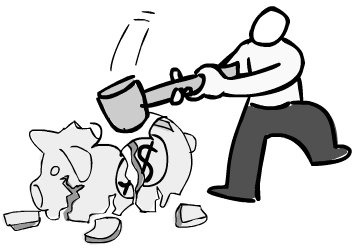 Unfortunately, there is no ONE best type of contract to manage. The risk the vendor and customer share is determined by the contract type. The best thing you can do is understand the risks and benefits of each. There are three categories of contracts: Fixed-Price, Cost-Reimbursable, and Time and Material (T&M). In this 3 part series, I will define the contracts in each category. Hopefully, it will help you on the PMP exam and out in the real world.
Unfortunately, there is no ONE best type of contract to manage. The risk the vendor and customer share is determined by the contract type. The best thing you can do is understand the risks and benefits of each. There are three categories of contracts: Fixed-Price, Cost-Reimbursable, and Time and Material (T&M). In this 3 part series, I will define the contracts in each category. Hopefully, it will help you on the PMP exam and out in the real world.
Fixed-Price is a category of contract involving setting a fixed total price for a defined scope of work to be provided. Fixed-price may also incorporate financial incentives for achieving or exceeding selected project objectives, such as schedule delivery dates, cost and technical performance, or anything that can be quantified and subsequently measured. Sellers under fixed-price contracts are legally obligated to complete such contracts, with possible financial damages if they do not. Under the fixed-price arrangement, buyers must precisely specify the products or services being procured. Changes in scope can be accommodated, but generally at an increase in contact price.
- Firm Fixed Price Contracts (FFP) are the most commonly used contract type. It is favored by most buying organizations because the price for goods is set at the outset and not subject to change unless the scope of work changes. Any cost increase due to negative performance is the responsibility of the seller, who is obligated to complete the effort.
- Fixed Price Incentive Fee Contracts (FPIF) are arrangements which give the buyer and seller some flexibility whereby allowing for deviation from performance, with financial incentives tied to achieving agreed to metrics. Typically such financial incentives are related to cost, schedule, or technical performance of the seller. Performance targets are established at the outset, and the final contract price is determined after completion of all work, based on the seller's performance. Under FPIF contracts, a price ceiling is set, and all costs above the price ceiling are the responsibility of the seller, who is obligated to complete the work.
- Fixed Price with Economic Price Adjustment Contracts (FP-EPA) are used whenever the seller's performance period spans a considerable period of years, as is desired with many long-term relationships. FP-EPA is a fixed-price contract, but with a special provision allowing for predefined final adjustments to the contract price due to changed conditions, such as inflation changes, or cost increases (or decreases) for specific commodities. The EPA clause must relate to some reliable financial index which is used to precisely adjust the final price. The FP-EPA contract is intended to protect both buyer and seller from external conditions beyond their control.
Next in my series on Contracts, I'll define Cost-Reimbursable and Time and Material Contracts (T&M)
Image Source: Pictofigo
